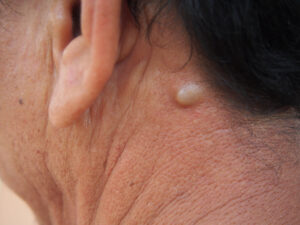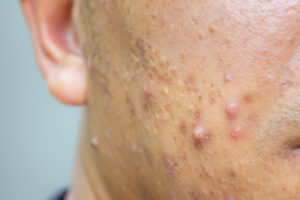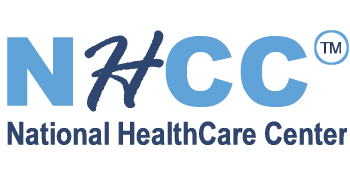
If you are looking for Fayetteville, GA cyst excisions from a skilled dermatologist, you may be currently experiencing cysts. Cysts, especially in the form of cystic acne, can be both painful and embarrassing for the patient—though there are many different kinds of cysts and an abundance of treatment options available.
But what is a cyst, exactly? A cyst is a sac-like structure that forms deep within the skin due to an accumulation of fluid like natural oil (sebum) or dead skin cells. Cysts can vary in size from very small to quite large. They may be filled with air, fluid, pus, or other bodily fluids, similar to a blister. In this article, we will discuss everything you need to know about cysts: what causes them, how they are treated, and other Frequently Asked Questions.
What Causes a Cyst?
Cysts can occur within your skin or nearly anywhere within your body. In fact, in extreme cases, large cysts have been known to displace organs. However, there are quite a number of different kinds of cysts. In the following section, we will give you an idea of just how many there are!
What Are the Different Types of Cysts?
While there are many different kinds and many different causes of cysts, they all have one thing in common: they have a distinct membrane known as the cyst wall that separates the nodule from the surrounding tissue. Here are some of the most common types of cysts:
- Sebaceous cysts: Typically found on the torso, neck, or face, this type of cyst is generally the result of trauma to the sebaceous glands, whether from surgery or injury. This type of cyst may grow large and cause the patient to experience pain—but it is a slow-growing cyst and is considered benign.
- Epidermoid cysts: This type of benign cyst is usually found on the neck, face, head, genitals, or back and is considered benign and slow-moving. It’s thought to be caused by an excess of subdermal keratin. If infected, epidermoid cysts may become inflamed and increasingly painful.
- Ganglion cysts: Typically due to overuse or injury, these gel-filled cysts typically occur amongst tendons in active parts of the body, such as wrists, hands, feet, and ankles. This type of cyst is considered non-cancerous, though it can become painful of it grows large enough to place pressure on the nearby joints and tendons.
- Pilonidal cysts: This type of cyst is thought to be caused during the transition of puberty as hair grows increasingly and hormones change. It is found in the uppermost cleft of the buttocks after a patient goes through puberty and they may become infected and filled with puss. If your pilonidal cyst oozes puss or blood, swells to a large size, or becomes red, inflamed, or painful, it may be infected and require medical attention.
- Baker’s cysts (otherwise known as popliteal cysts): Generally found at the back of the knee, this fluid-filled sac can stem from knee injuries or even arthritis. While this type of cyst is sometimes painless, it can become increasingly large and painful, limiting the range of motion of the knee and even rupturing. However, Baker’s cysts will usually go away on their own without treatment.
- Ovarian cysts: These cysts develop in one or two ovaries and range in effect from being asymptomatic to becoming extremely painful. You may experience particularly painful intercourse, bowel movements, periods, abdominal bloating, nausea, vomiting, and any other number of symptoms, including breast tenderness. If you suspect you may have an ovarian cyst, it is best to have it examined by a gynecologist, as cyst rupture can cause severe pain, fever, and ovarian torsion.
- Pilar cysts: This type of non-cancerous growth is typically found on the scalp and is generally smooth, painless, and slow to develop.
- Branchial cleft cysts: Developing on either both or a single side of the neck or beneath the collarbone, this type of cyst typically begins during embryonic development and generally will not become cancerous—however, in rare cases, it will. Symptoms can include fluid draining from the cyst, swelling and sometimes moderate pain.
- Mucous cysts: Occurring in the mouth, a mucous cyst occurs when mucus causes the salivary glands to become plugged. This can be due to trauma or injury, gland disruption, or even habits like biting your lips. These small, liquid-filled nodules or soft and blue or pink in color.
- Breast cysts: Breast cysts are distinct from cancerous growths and may be caused of any number of causes. If there are any unusual changes in your breast tissue, including discharge from the nipple or sudden inversion of the nipple, seek immediate health attention right away.
- Perineural cysts: While the cause of these cysts is yet unknown, it is expected that they occur as the result of back trauma from heavy exertion or injury. These fluid-filled nodules form in the spine and rarely cause symptoms—though in some cases, they cause pain in the legs, buttocks, hips, or lower back.
- Cystic acne: This relatively uncommon form of acne occurs in about 4% of Americans and is considered the most severe form of acne. While the exact cause is unknown, it may be the result of bacteria, dead skin cells, oil, hormone changes, or even family genetics. These cysts are painful when they grow large and may scar if they are allowed to rupture. Cystic acne typically occurs on the arms, back, chest, neck, and face.

Can Cysts Be Cancerous?
Most cysts are considered non-cancerous or benign, but some can be precancerous or even indicate cancer. If a benign cyst becomes infected, inflamed, or large in size, it may cause pain or sensitivity in the surrounding area, nerve or blood vessel stress, or even stress on a nearby organ.
Cysts are determined to be malignant, or cancerous, if they fall into either of the following categories: intraductal papillary mucinous neoplasms, or mucinous cystic neoplasms. In either case, the cyst that harbors cancer will secrete mucinous fluid into the cyst.
Are Cysts Painful?
Smaller, benign cysts that are not infected are typically not too painful or even noticeable for the patient. However, the larger the cyst grows, the greater its impact on your body, and the more likely it is to cause stress and pain.
When Should Cysts Be Removed?
Some cysts are small, asymptomatic, and/or go away on their own. Generally, a dermatologist will not recommend removing a cyst unless it is continuing to grow in size, pressure, and pain, if it becomes infected, or if it becomes malignant. Typically cysts that have been excised will be tested to ensure it is not malignant.
Should You Pop a Cyst?
The short answer to this question is no! Never pop a cyst, as it can cause infection, scarring, or both. If you have a painful or malignant cyst that you would like to have removed, contact a skilled dermatologist for Fayetteville, GA cyst excisions with the opportunity for inpatient care.
Will Cysts Go Away on Their Own?
Some types of cysts go away on their own, while others require treatment. However, it’s best to consult your dermatologist if you suspect you have a cyst and gather their professional opinion on whether or not you should proceed with a treatment plan, or let the cyst take its natural course. Cysts that continue to grow can cause complications to your basic bodily functions, such as organ or blood vessel stress, cause pain and infection, and potentially lead to scarring—or in a worst-case scenario, become cancerous.
What Is the Treatment for Cysts?
If you have the type of cyst that requires medical treatment, there are three different approaches most dermatologists take to reduce any patient discomfort. In some cases, they will use a needle or scalpel to drain the contents of the cyst and sterilize the area, reducing pressure and pain.
Another option is injecting the cyst with a corticosteroid which, while it initially increases the sensation of pressure on the cyst, ultimately should lead to the cyst becoming less inflamed. For patients who experience moderate cystic acne, this type of treatment is sometimes recommended, if they irregularly experience cysts.
The final option is excision or surgical removal, which completely removes all traces of the cyst. This is often recommended for patients with severe or internal cysts that are causing a significant amount of pain or discomfort.
Fayetteville, GA Cyst Excisions
If you’re looking for Fayetteville, GA cyst excisions, you’ve likely reached a stage of living with a cyst at which it has become painful and impacted your quality of life. While the exact causes of most types of cysts are not yet known for certain, what we do know is that cysts can be unpredictable in nature—they can either go away on their own with time, or grow larger, more painful, and more likely to become infected. If you or a loved one is experiencing any discomfort due to cysts of any kind, it is crucial to seek medical attention from an experienced dermatologist as soon as possible.
If you are currently dealing with a painful cyst, it’s likely time to take action. Contact the professionals at National HealthCare Center today to book an appointment!


